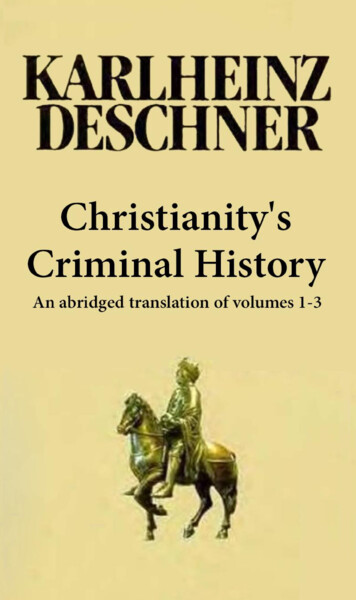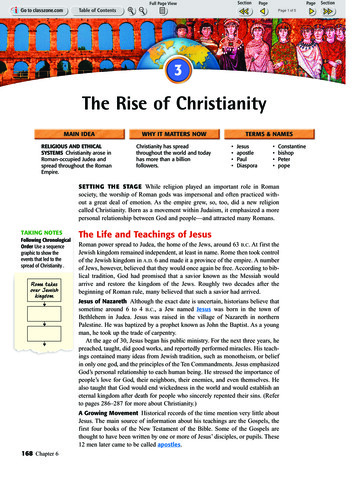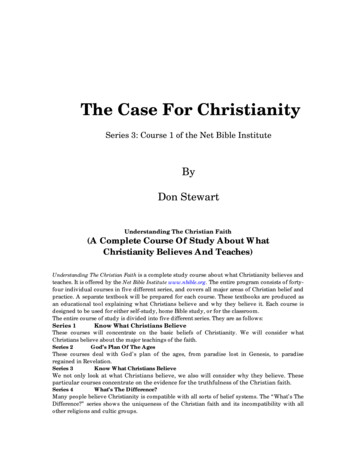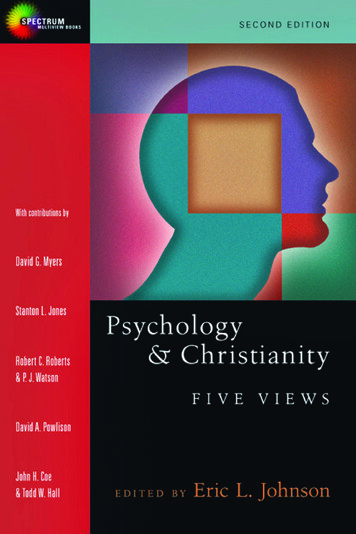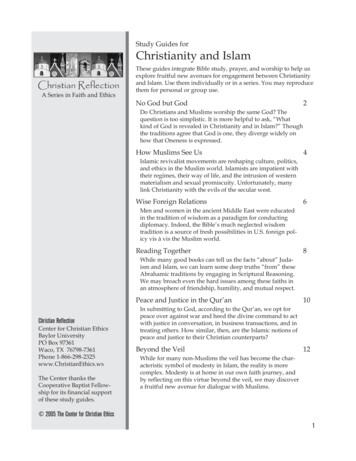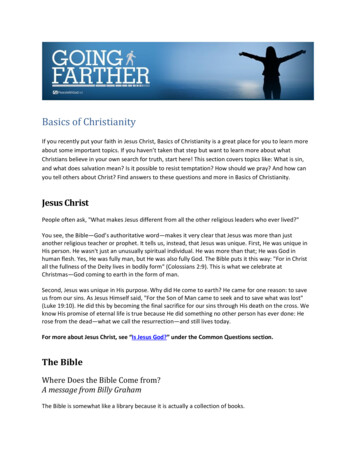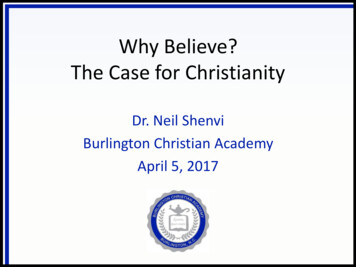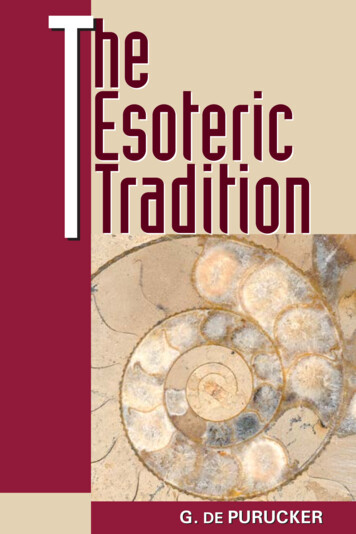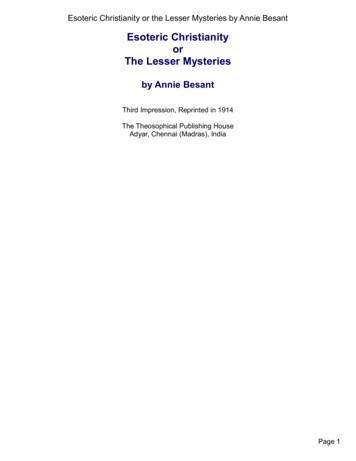
Transcription
Esoteric Christianity or the Lesser Mysteries by Annie BesantEsoteric ChristianityorThe Lesser Mysteriesby Annie BesantThird Impression, Reprinted in 1914The Theosophical Publishing HouseAdyar, Chennai (Madras), IndiaPage 1
Esoteric Christianity or the Lesser Mysteries by Annie BesantIn proceeding to the contemplation of the mysteries of knowledge, we shall adhere to the celebrated andvenerable rule of tradition, commencing from the origin of the universe, setting forth those points ofphysical contemplation which are necessary to be premised, and removing whatever can be an obstacleon the way; so that the ear may be prepared for the reception of the tradition of the Gnosis, the groundbeing cleared of weeds and fitted for the planting of the vineyard; for there is a conflict before the conflict,and mysteries before the mysteries.— S.Clement of Alexandria.Let the specimen suffice to those who have ears. For it is not required to unfold the mystery, but only toindicate what is sufficient.— S. Clement of Alexandria.He that hath ears to hear, let him hear.— S. Matthew.Page 2
Esoteric Christianity or the Lesser Mysteries by Annie BesantCONTENTSPageFOREWORDCHAPTER 1The Hidden Side of Religions1CHAPTER 2The Hidden Side of Christianity31CHAPTER 3The Hidden Side of Christianity (concluded)59CHAPTER 4The Historical Christ103CHAPTER 5The Mythic Christ125CHAPTER 6The Mythic Christ (concluded)147CHAPTER 7The Atonement166CHAPTER 8Resurrection and Ascension199CHAPTER 9The Trinity218CHAPTER 10Prayer238CHAPTER 11The Forgiveness of Sins259CHAPTER 12Sacraments279CHAPTER 13Sacraments (continued)298CHAPTER 14Revelation318AFTERWORD333Index335Page 3
Esoteric Christianity or the Lesser Mysteries by Annie BesantFOREWORDThe object of this book is to suggest certain lines of thought as to the deep truths underlying Christianity,truths generally overlooked, and only too often denied. The generous wish to share with all what isprecious, to spread broadcast priceless truths, to shut out none from the illumination of true knowledge,has resulted in a zeal without discretion that has vulgarised Christianity, and has presented its teachingsin a form that often repels the heart and alienates the intellect. The command to "preach the Gospel toevery creature" [ S.Mark, xvi, 15] - though admittedly of doubtful authenticity - has been interpreted asforbidding the teaching of the Gnosis to a few, and has apparently erased the less popular saying of thesame Great Teacher: "Give not that which is holy unto the dogs, neither cast ye your pearls beforeswine". [S. Matt., vii,6]This spurious sentimentality — which refuses to recognise the obvious inequalities of intelligence andmorality, and thereby reduces the teaching of the highly developed to the level attainable by the leastevolved, sacrificing the higher to the lower in a way that injures both — had no place in the virile commonsense of the early Christians. S. Clement of Alexandria says quite bluntly, after alluding to the Mysteries:"Even now I fear, as it is said, 'to cast the pearls before swine, lest they tread them underfoot, and turnand rend us'. For it is difficult to exhibit the really pure and transparent words respecting the true Light toswinish and untrained hearers". [Clarke's Ante-Nicene Christian Library, Vol. IV. Clement of Alexandria.Stromata, bk. I, ch. xii. ]If true knowledge, the Gnosis, is again to form a part of Christian teachings, it can only be under the oldrestrictions, and the idea of levelling down to the capacities of the least developed must be definitelysurrendered. Only by teaching above the grasp of the little evolved can the way be opened up for arestoration of arcane knowledge, and the study of the Lesser Mysteries must precede that of the Greater.The Greater will never be published through the printing-press; they can only be given by Teacher topupil, "from mouth to ear". But the Lesser Mysteries the partial unveiling of deep truths, can even now berestored, and such a volume as the present is intended to outline these, and to show the nature of theteachings which have to be mastered. "Where only hints are given, quiet meditation on the truths hintedat will cause their outlines to become visible, and the clearer light obtained by continued meditation willgradually show them more fully. For meditation quiets the lower mind, ever engaged in thinking aboutexternal objects, and when the lower mind is tranquil then only can it be illuminated by the Spirit.Knowledge of spiritual truths must be thus obtained, from within and not from without, from the divineSpirit whose temple we are [I. Cor., iii., 16. ] and not from an external Teacher. These things are"spiritually discerned" by that divine indwelling Spirit, that "mind of Christ", whereof speaks the greatApostle [Ibid., ii., 14, 16. ] and that inner light is shed upon the lower mind.This is the way of the Divine Wisdom, the true THEOSOPHY. It is not, as some think, a diluted version ofHinduism, or Buddhism, or Taoism, or of any special religion. It is Esoteric Christianity as truly as it isEsoteric Buddhism, and belongs equally to all religions, exclusively to none. This is the source of thesuggestions made in this little volume, for the helping of those who seek the Light — that "true Lightwhich lighteth every man that cometh into the world", [ S.John, 1,9] though most have not yet openedtheir eyes to it. It does not bring the Light. It only says: "Behold the Light!" For thus have we heard. Itappeals only to the few who hunger for more than the exoteric teachings give them. For those who arefully satisfied with the exoteric teachings, it is not intended; for why should bread be forced on those whoare not hungry ? For those who hunger, may it prove bread, and not a stone.Page 4
Esoteric Christianity or the Lesser Mysteries by Annie BesantCHAPTER 1THE HIDDEN SIDE OF RELIGIONS[Page 1]MANY,perhaps most, who see the title of this book will at once traverse it, and will deny that thereis anything valuable which can be rightly described as "Esoteric Christianity". There is a wide-spread, andwithal a popular, idea that there is no such thing as an occult teaching in connection with Christianity, andthat "The Mysteries", whether Lesser or Greater, were a purely Pagan institution. The very name of "TheMysteries of Jesus", so familiar in the ears of the Christians of the first centuries, would come with ashock of surprise on those of their modern successors, and, if spoken as denoting a special and definiteinstitution in the Early [Page 2] Church, would cause a smile of incredulity. It has actually been made amatter of boast that Christianity has no secrets, that whatever it has to say it says to all, and whatever ithas to teach it teaches to all. Its truths are supposed to be so simple, that "a way-faring man, though afool, may not err therein", and the "simple Gospel" has become a stock phrase.It is necessary, therefore, to prove clearly that in the Early Church, at least, Christianity was no whitbehind other great religions in possessing a hidden side, and that it guarded, as a priceless treasure, thesecrets revealed only to a select few in its Mysteries. But ere doing this it will be well to consider thewhole question of this hidden side of religions, and to see why such a side must exist if a religion is to bestrong and stable; for thus its existence in Christianity will appear as a foregone conclusion, and thereferences to it in the writings of the Christian Fathers will appear simple and natural instead of surprisingand unintelligible. As a historical fact, the existence of this esotericism is demonstrable; but it may also beshown that intellectually it is a necessity.The first question we have to answer is: What is the object of religions? They are given to [Page 3] theworld by men wiser than the masses of the people on whom they are bestowed, and are intended toquicken human evolution. In order to do this effectively they must reach individuals and influence them.Now all men are not at the same level of evolution, but evolution might be figured as a rising gradient,with men stationed on it at every point. The most highly evolved are far above the least evolved, both inintelligence and character; the capacity alike to understand and to act varies at every stage. It is,therefore, useless to give to all the same religious teaching; that which would help the intellectual manwould be entirely unintelligible to the stupid, while that which would throw the saint into ecstasy wouldleave the criminal untouched. If, on the other hand, the teaching be suitable to help the unintelligent, it isintolerably crude and jejune to the philosopher, while that which redeems the criminal is utterly useless tothe saint. Yet all the types need religion, so that each may reach upward to a life higher than that whichhe is leading, and no type or grade should be sacrificed to any other. Religion must be as graduated asevolution, else it fails in its object.Next comes the question: In what way do religions seek to quicken human evolution? [Page 4] Religionsseek to evolve the moral and intellectual natures, and to aid the spiritual nature to unfold itself. Regardingman as a complex being, they seek to meet him at every point of his constitution, and therefore to bringmessages suitable for each, teachings adequate to the most diverse human needs. Teachings musttherefore be adapted to each mind and heart to which they are addressed. If a religion does not reachand master the intelligence, if it does not purify and inspire the emotions, it has failed in its object, so faras the person addressed is concerned.Page 5
Esoteric Christianity or the Lesser Mysteries by Annie BesantNot only does it thus direct itself to the intelligence and the emotions, but it seeks, as said, to stimulatethe unfoldment of the spiritual nature. It answers to that inner impulse which exists in humanity, andwhich is ever pushing the race onwards. For deeply within the heart of all — often overlaid by transitoryconditions, often submerged under pressing interests and anxieties — there exists a continual seekingafter God. "As the hart panteth after the water-brooks, so panteth" [ Psalms, xlii,1] humanity after God.The search is sometimes checked for a space, and the yearning seems to disappear. Phases recur incivilisation and in thought, wherein this cry of the human [Page 5] Spirit for the divine — seeking its sourceas water seeks its level, to borrow a simile from Giordano Bruno — this yearning of the human Spirit forthat which is akin to it in the universe, of the part for the whole, seems to be stilled, to have vanished;none the less does that yearning re-appear, and once more the same cry rings out from the Spirit.Trampled on for a time, apparently destroyed, though the tendency may be, it rises again and again withinextinguishable persistence, it repeats itself again and again, no matter how often it is silenced; and itthus proves itself to be an inherent tendency in human nature, an ineradicable constituent thereof. Thosewho declare triumphantly, "Lo! it is dead!" find it facing them again with undiminished vitality. Those whobuild without allowing for it find their well-constructed edifices riven as by an earthquake. Those who holdit to be out-grown find the wildest superstitions succeed its denial. So much is it an integral part ofhumanity, that man will have some answer to his questionings; rather an answer that is false, than none.If he cannot find religious truth, he will take religious error rather than no religion, and will accept thecrudest and most incongruous ideals rather than admit that the ideal is non-existent. [Page 6]Religion, then, meets this craving, and taking hold of the constituent in human nature that gives rise to it,trains it, strengthens it, purifies it and guides it towards its proper ending — the union of the human Spiritwith the divine, so "that God may be all in all".[ I Cor., xv,28]The next question which meets us in our enquiry is: What is the source of religions ? To this question twoanswers have been given in modern times — that of the comparative Mythologists and that of theComparative Religionists. Both base their answers on a common basis of admitted facts. Research hasindisputably proved that the religions of the world are markedly similar in their main teachings, in theirpossession of Founders who display superhuman powers and extraordinary moral elevation, in theirethical precepts, in their use of means to come into touch with invisible worlds, and in the symbols bywhich they express their leading beliefs. This similarity, amounting in many cases to identity, proves—according to both the above schools — a common origin.But on the nature of this common origin the two schools are at issue. The Comparative Mythologists[Page 7] contend that the common origin is the common ignorance, and that the loftiest religious doctrinesare simply refined expressions of the crude and barbarous guesses of savages, of primitive men,regarding themselves and their surroundings. Animism, fetishism, nature-worship, sun-worship — theseare the constituents of the primeval mud out of which has grown the splendid lily of religion. A Krishna, aBuddha, a Lao-tze, a Jesus, are the highly civilised but lineal descendants of the whirling medicine-manof the savage. God is a composite photograph of the innumerable Gods who are the personifications ofthe forces of nature. And so forth. It is all summed up in the phrase: Religions are branches from acommon trunk — human ignorance.The Comparative Religionists consider, on the other hand, that all religions originate from the teachingsof Divine Men, who give out to the different nations of the world, from time to time, such parts of thefundamental verities of religion as the people are capable of receiving, teaching ever the same morality,Page 6
Esoteric Christianity or the Lesser Mysteries by Annie Besantinculcating the use of similar means, employing the same significant symbols. The savage religions —animism and the rest—are degenerations, the results of decadence, [Page 8] distorted and dwarfeddescendants of true religious beliefs. Sun-worship and pure forms of nature-worship were, in their day,noble religions, highly allegorical but full of profound truth and knowledge. The great Teachers—it isalleged by Hindus, Buddhists, and by some Comparative Religionists, such as Theosophists—form anenduring Brotherhood of men who have risen beyond humanity, who appear at certain periods toenlighten the world, and who are the spiritual guardians of the human race. This view may be summedup in the phrase: "Religions are branches from a common trunk — Divine Wisdom".This Divine Wisdom is spoken of as the Wisdom, the Gnosis, the Theosophia, and some, in differentages of the world, have so desired to emphasise their belief in this unity of religions, that they havepreferred the eclectic name of Theosophist to any narrower designation.The relative value of the contentions of these two opposed schools must be judged by the cogency of theevidence put forth by each. The appearance of a degenerate form of a noble idea may closely resemblethat of a refined product of a coarse idea, and the only method of deciding between degeneration andevolution would be [Page 9] the examination, if possible, of intermediate and remote ancestors. Theevidence brought forward by believers in the Wisdom is of this kind. They allege: that the Founders ofreligions, judged by the records of their teachings, were far above the level of average humanity that theScriptures of religions contain moral precepts, sublime ideals, poetical aspirations, profoundphilosophical statements, which are not even approached in beauty and elevation by later writings in thesame religions — that is, that the old is higher than the new, instead of the new; being higher than theold; that no case can be shown of the refining and improving process alleged to be the source of currentreligions, whereas many cases of degeneracy from pure teachings can be adduced; that even amongsavages, if their religions be carefully studied, many traces of lofty ideas can be found, ideas which areobviously above the productive capacity of the savages themselves.This last idea has been worked out by Mr. Andrew Lang, who — judging by his book on The Making ofReligion — should be classed as a Comparative Religionist rather than as a Comparative Mythologist.He points to the existence of a common tradition, which, he alleges, cannot have [Page 10] been evolvedby the savages for themselves, being men whose ordinary beliefs are of the crudest kind and whoseminds are little developed. He shows, under crude beliefs and degraded views, lofty traditions of asublime character, touching the nature of the Divine Being and His relations with men. The deities whoare worshipped are, for the most part, the veriest devils, but behind, beyond all these, there is a dim butglorious overarching Presence, seldom or never named, but whispered of as source of all, as power andlove and goodness, too tender to awaken terror, too good to require supplication. Such ideas manifestlycannot have been conceived by the savages among whom they are found, and they remain as eloquentwitnesses of the revelations made by some great Teacher—dim tradition of whom is generally alsodiscoverable — who was a Son of the Wisdom, and imparted some of its teachings in a long bye-goneage.The reason, and, indeed, the justification, of the view taken by the Comparative Mythologists is patent.They found in every direction low forms of religious belief, existing among savage tribes. These wereseen to accompany general lack of civilisation. Regarding civilised men as evolving from uncivilised,what more natural than to [Page 11] regard civilised religion as evolving from uncivilised ? It is the firstobvious idea. Only later and deeper study can show that the savages of to-day are not our ancestralPage 7
Esoteric Christianity or the Lesser Mysteries by Annie Besanttypes, but are the degenerated offsprings of great civilised stocks. of the past, and that man in his infancywas not left to grow up untrained, but was nursed and educated by his elders, from whom he received hisfirst guidance alike in religion and civilisation. This view is being substantiated by such facts as thosedwelt on by Lang, and will presently raise the question, "Who were these elders, of whom traditions areeverywhere found? "Still pursuing our enquiry, we come next to the question: To what people were religions given ? And herewe come at once to the difficulty with which every Founder of a religion must deal, that already spoken ofas bearing on the primary object of religion itself, the quickening of human evolution, with its corollarythat all grades of evolving humanity must be considered by Him. Men are at every stage of evolution,from the most barbarous to the most developed; men are found of lofty intelligence, but also of the mostunevolved mentality; in one place there is a highly developed and complex civilisation, in another a crudeand simple polity. Even within [Page 12] any given civilisation we find the most varied types — the mostignorant and the most educated, the most thoughtful and the most careless, the most spiritual and themost brutal; yet each one of these types must be reached, and each must be helped in the place wherehe is. If evolution be true, this difficulty is inevitable, and must be faced and overcome by the divineTeacher, else will His work be a failure. If man is evolving as all around him is evolving, these differencesof development, these varied grades of intelligence, must be a characteristic of humanity everywhere,and must be provided for in each of the religions of the world.We are thus brought face to face with the position that we cannot have one and the same religiousteaching even for a single nation, still less for a single civilisation, or for the whole world. If there be butone teaching, a large number of those to whom it is addressed will entirely escape its influence. If it bemade suitable for those whose intelligence is limited, whose morality is elementary, whose perceptionsare obtuse, so that it may help and train them, and thus enable them to evolve, it will be a religion utterlyunsuitable for those men, living in the same nation, forming part of the same [Page 13] civilisation, whohave keen and delicate moral perceptions, bright and subtle intelligence, and evolving spirituality. But if,on the other hand, this latter class is to be helped, if intelligence is to be given a philosophy that it canregard as admirable, if delicate moral perceptions are to be still further refined, if the dawning spiritualnature is to be enabled to develop into the perfect day, then the religion will be so spiritual, so intellectual,and so moral, that when it is preached to the former class it will not touch their minds or their hearts, itwill be to them a string of meaningless phrases, incapable of arousing their latent intelligence, or of givingthem any motive for conduct which will help them to grow into a purer morality.Looking, then, at these facts concerning religion, considering its object, its means, its origin, the natureand varying needs of the people to whom it is addressed, recognising the evolution of spiritual,intellectual, and moral faculties in man, and the need of each man for such training as is suitable for thestage of evolution at which he has arrived, we are led to the absolute necessity of a varied and graduatedreligious teaching, such as will meet these different needs and help each man in his own place.[Page 14]There is yet another reason why esoteric teaching is desirable with respect to a certain class of truths. Itis eminently the fact in regard to this class that "knowledge is power". The public promulgation of aphilosophy profoundly intellectual, sufficient to train an already highly developed intellect, and to draw theallegiance of a lofty mind, cannot injure any. It can be preached without hesitation, for it does not attractthe ignorant, who turn away from it as dry, stiff, and uninteresting. But there are teachings which deal withthe constitution of nature, explain recondite laws, and throw light on hidden processes, the knowledge ofPage 8
Esoteric Christianity or the Lesser Mysteries by Annie Besantwhich gives control over natural energies, and enables its possessor to direct these energies to certainends, as a chemist deals with the production of chemical compounds. Such knowledge may be veryuseful to highly developed men, and may much increase their power of serving the race. But if thisknowledge were published to the world, it might and would be misused, just as the knowledge of subtlepoisons was misused in the Middle Ages by the Borgias and by others. It would pass into the hands ofpeople of strong intellect, but of unregulated desires, men moved by separative instincts, seeking thegain of their [Page 15] separate selves and careless of the common good. They would be attracted by theidea of gaining powers which would raise them above the general level, and place ordinary humanity attheir mercy, and would rush to acquire the knowledge which exalts its possessors to a superhuman rank.They would, by its possession, become yet more selfish and confirmed in their separateness, their pridewould be nourished and their sense of aloofness intensified, and thus they would inevitably be drivenalong the road which leads to diabolism, the Left Hand Path whose goal is isolation and not union. Andthey would not only themselves suffer in their inner nature, but they would also become a menace toSociety, already suffering sufficiently at the hands of men whose intellect is more evolved than theirconscience. Hence arises the necessity of withholding certain teachings from those who, morally, are asyet unfitted to receive them; and this necessity presses on every Teacher who is able to impart suchknowledge. He desires to give it to those who will use the powers it confers for the general good, forquickening human evolution; but he equally desires to be no party to giving it to those who would use itfor their own aggrandisement at the cost of others. [Page 16]Nor is this a matter of theory only, according to the Occult Records, which give the details of the eventsalluded to in Genesis vi. et seq. This knowledge was, in those ancient times and on the continent ofAtlantis, given without any rigid conditions as to the moral elevation, purity, and unselfishness of thecandidates. Those who were intellectually qualified were taught, just as men are taught ordinary sciencein modern days. The publicity now so imperiously demanded was then given, with the result that menbecame giants in knowledge but also giants in evil, till the earth groaned under her oppressors and thecry of a trampled humanity rang through the worlds. Then came the destruction of Atlantis, the whelmingof that vast continent beneath the waters of the ocean, some particulars of which are given in the HebrewScriptures in the story of the Noachian deluge, and in the Hindu Scriptures of the further East in the storyof Vaivasvata Manu.Since that experience of the danger of allowing unpurified hands to grasp the knowledge which is power,the great Teachers have imposed rigid conditions as regards purity, unselfishness, and self-control on allcandidates for such instruction. They distinctly refuse to impart knowledge of [Page 17] this kind to anywho will not consent to a rigid discipline, intended to eliminate separateness of feeling and interest. Theymeasure the moral strength of the candidate even more than his intellectual development, for theteaching itself will develop the intellect while it puts a strain on the moral nature. Far better that the GreatOnes should be assailed by the ignorant for Their supposed selfishness in withholding knowledge, thanthat They should precipitate the world into another Atlantean catastrophe.So much of theory we lay down as bearing on the necessity of a hidden side in all religions. When fromtheory we turn to facts, we naturally ask: Has this hidden side existed in the past, forming a part of thereligions of the world ? The answer must be an immediate and unhesitating affirmative; every greatreligion has claimed to possess a hidden teaching, and has declared that it is the repository of theoreticalmystic, and further of practical mystic, or occult, knowledge. The mystic explanation of popular teachingwas public, and expounded the latter as an allegory, giving to crude and irrational statements and storiesPage 9
Esoteric Christianity or the Lesser Mysteries by Annie Besanta meaning which the intellect could accept. Behind this theoretical mysticism, as it was behind thepopular, there existed further the [Page 18] practical mysticism, a hidden spiritual teaching, which was onlyimparted under definite conditions, conditions known and published, that must /be fulfilled by everycandidate. S. Clement of Alexandria mentions this division of the Mysteries. After purification, he says,"are the Minor Mysteries, which have some foundation of instruction and of preliminary preparation forwhat is to come after, and the Great Mysteries, in which nothing remains to be learned of the universe,but only to contemplate and comprehend nature and things".[Ante-Nicene Library, Vol. XII. Clement ofAlexandria. Stromata, bk, V, ch. xi. ]This position cannot be controverted as regards the ancient religions. The Mysteries of Egypt were theglory of that ancient land, and the noblest sons of Greece, such as Plato, went to Sais and to Thebes tobe initiated by Egyptian Teachers of Wisdom. The Mithraic Mysteries of the Persians, the Orphic andBacchic Mysteries and the later Eleusinian semi-Mysteries of the Greeks, the Mysteries of Samothrace,Scythia, Chaldea, are familiar in name, at least, as household words. Even in the extremely diluted formof the Eleusinian Mysteries, their value is most highly praised by the most eminent men of [Page 19]Greece, as Pindar, Sophocles, Isocrates, Plutarch, and Plato. Especially were they regarded as usefulwith regard to post-mortem existence, as the Initiated learned that which ensured his future happiness.Sopater further alleged that Initiation established a kinship of the soul with the divine Nature, and in theexoteric Hymn to Demeter covert references are made to the holy child, lacchus, and to his death andresurrection, as dealt with in the Mysteries.[See Article on "Mysteries", Encyc. Britannica, ninth edition ]From lamblichus, the great theurgist of the third and fourth centuries A.D., much may be learned as to theobject of the Mysteries. Theurgy was magic, "the last part of the sacerdotal science", [Psellus, quoted inlamblichus on the Mysteries. T. Taylor, p. 343, note on p. 23, second edition. ] and was practised in theGreater Mysteries, to evoke the appearance of superior Beings. The theory on which these Mysterieswere based may be very briefly thus stated: There is ONE, prior to all beings, immovable, abiding in thesolitude of His own unity. Prom THAT arises the Supreme God, the Self-begotten, the Good, the Sourceof all things, the Root, the God of Gods, the First Cause, unfolding Himself [Page 20] into Light.[ lamblichus, as ante, p. 301 ] From Him springs the Intelligible World, or ideal universe, the UniversalMind, the Nous, and the incorporeal or intelligible Gods belong to this. From this the World-Soul, to whichbelong the "divine intellectual forms which are present with the visible bodies of the Gods". [ Ibid., p. 72. ]Then come various hierarchies of super-human beings, Archangels Archons (Rulers) or Cosmocratores,Angels, Daimons, etc. Man is a being of a lower order, allied to these in his nature, and is capable ofknowing them; this knowledge was achieved in the Mysteries, and it led to union with God.
Esoteric Christianity or the Lesser Mysteries by Annie Besant CHAPTER 1 THE HIDDEN SIDE OF RELIGIONS [Page 1]MANY, perhaps most, who see the title of this book will at once traverse it, and will deny that there is anything valuable which can be rightly described as "Esoteric Christianity".



